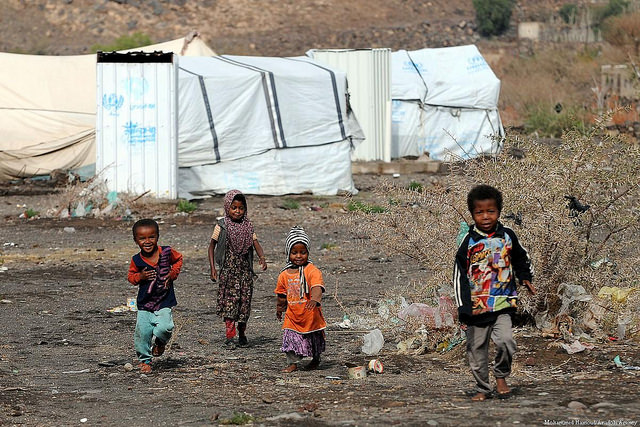Updated
Yemeni Refugees Taking Charge of Their Futures in Morocco – Jean R. AbiNader

Yemeni children at Darwan refugee camp in Amran north of Sana’a, Yemen Photo: Felton Davis
Jean R. AbiNader
May 10, 2018
A recent story circulated by the UN High Commissioner for Refugees (UNHCR) looked at the case of how Yemeni refugees in Morocco were taking charge of their futures by initiating projects that serve both the Yemeni and Moroccan communities.
The project is a kindergarten for all children, called Amal or Hope, which recently opened in Kenitra, north of the capital Rabat. Although there are some 6,000 registered Arab refugees in Morocco, mostly Syrians, Yemenis make up only 530 of the total and they are seeking refuge from the world’s largest humanitarian crisis.
As mentioned in a previous blog, Morocco has become a destination for refugees as well as a transit point for those seeking to get to Europe. Since September 2013, the government adopted a number of initiatives to give new protections for migrants and refugees, providing access to public education, health services, and the job market. “In 2016,” according to the announcement, “the country introduced further changes allowing refugees to establish their own cooperatives which, according to a local partner of UNHCR, the UN Refugee Agency, benefits refugees seeking sustainable livelihoods.”
Oualid Chourak, program manager at the Moroccan Association for Supporting the Promotion of Small Enterprises (AMAPPE) noted that “Cooperatives are beneficial for refugees. The new law provides for tax exemption, which is a competitive advantage over other types of businesses. It also allows access to micro-credit schemes.”
The Yemeni founder of the school was studying for his Ph.D. in Morocco when the civil war broke out and he realized that he couldn’t go back any time toon. So he got together with other Yemeni professionals living in Morocco and started the kindergarten. “A total of 25 Moroccan and Yemeni children attend the kindergarten and, besides the eight Yemeni partners, it employs seven local staff as teachers, nursery assistants, administrative staff, and a concierge.”
The educational program follows the Moroccan educational system, “And we promote the values of honesty, transparency, kindness and respect for our employees,” according to the founder. He and his partners have plans eventually to expand the cooperative to include a primary and secondary school. Currently, AMAPPE is working with the UNHCR on two other projects in cooperation with the National Cooperation Development Office, with financial support from Switzerland and Monaco.
“In the first, 10 Yemeni refugee women will open a restaurant specializing in traditional Yemeni cuisine, catering, and events,” which should be quite intriguing given similar tribal traditions in Morocco for events such as weddings and anniversaries. “Another, run by eight Yemeni refugees, will focus on poultry meat processing.”
In its annual Human Rights Report, the US Department of State praised Morocco’s progressive policies in support of refugees. It states that “The Moroccan government cooperated with the Office of the UN High Commissioner for Refugees (UNHCR) and other humanitarian organizations in providing protection and assistance to refugees, returning refugees, asylum seekers, and other persons of concern,” as well as provided funding to humanitarian organizations to provide social services to migrants, including refugees.
Notably, Syrian and Yemeni refugees receive “exceptional regularization” that goes beyond the innovative program for sub-Saharan migrants, which reflects the extraordinary political conditions of their status.
